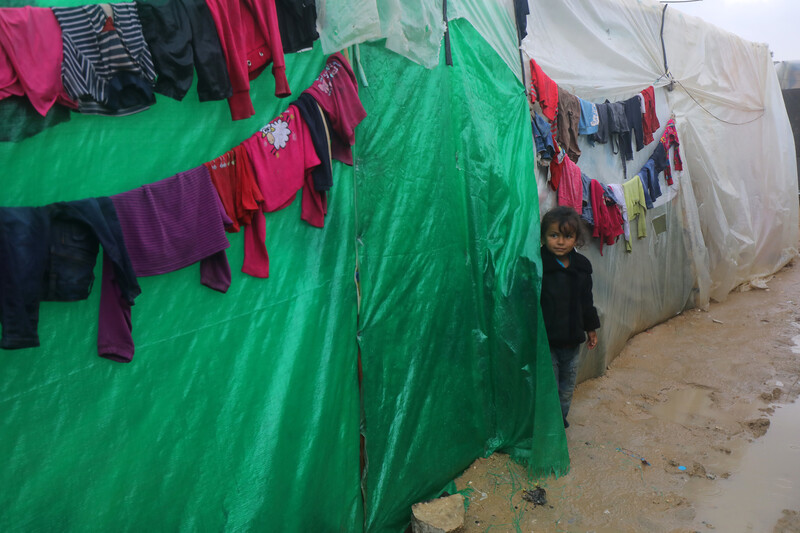The Electronic Intifada 11 October 2024

A child at a camp for displaced people in Deir al-Balah, central Gaza Strip, in December 2023.
APA imagesWinter was once the season that filled my heart with joy.
I eagerly awaited its arrival, savoring the first hints of a chill in the air. There was magic in the way rain danced against my window, each drop painting the earth back to life.
The crisp air, infused with the scent of damp soil and fresh leaves, brought a sense of peace.
It was a season of hope, of renewal.
Inside our home, warmth wrapped around us like a blanket, a stark contrast to the cold outside. My mother would prepare hot tea and biscuits on rainy afternoons, and we would gather by the fire as a family.
Stories flowed as easily as our laughter, and our home became a sanctuary, shielding us from the world outside.
But now, winter is a season I dread.
Season of death
The Israeli occupation has turned my beloved season into a waking nightmare. Last winter, the sky didn’t bring life, but a storm of death. Bombs fell like thunder, and the rain no longer carried the promise of renewal — it reeked of blood.
In an instant, the warmth and safety of our home were ripped away, replaced by chaos and destruction.
The Israeli military operations intensified as the cold tightened its grip. We were forced to flee, running from one place to another under the downpour of rain and the roar of explosions. We left with nothing but the clothes on our backs.
The sound of tanks, the unrelenting buzz of drones, and the terrifying scream of fighter jets drowned out everything else. There was no time for food, no chance to gather warm clothes or blankets. Survival was all that mattered.
Hours later, we found ourselves on the streets — homeless, drenched and shivering.
That’s when the true nightmare began.
Only endless cold
Of all the horrors I’ve faced in this genocide, nothing compares to the cold of that night close to the sea. There was no shelter and no fire to ease the chill. I remember sitting in the dark, the wind slicing through me like shards of glass. My body was numb, my skin turning purple and blue, and the pain was sharp and unyielding.
The rain soaked through our makeshift tent, turning the ground beneath us into a muddy swamp. The cold bit into my flesh, relentless, leaving me helpless. My fingers were too stiff to move, and all I could do was rub my hands together, praying for a warmth that never came.
I wished for something as simple as a blanket — just one — to wrap myself in and escape the cold.
But even that small comfort was a distant luxury.
The night was a blur of misery. Around me, others huddled together, shaking, desperate for any trace of warmth. I searched the darkness for a spark of hope. There was none, only the endless cold.
I cursed the occupation.
When winter finally passed, there was a fleeting sense of relief, as if the cold had taken a fraction of our suffering with it. But the genocide continues and another winter looms on the horizon.
The dread grows with each passing day — the fear of reliving that nightmare, of being swallowed once again by the cold. As the chill returns to the air, I find myself asking the same question over and over:
When will this end?
Shahad Ali is an English literature student at the Islamic University of Gaza.





